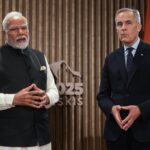In a stunning display of athletic prowess that defies conventional wisdom about age and endurance sports, a 48-year-old Canadian woman has claimed victory in the women’s division of the Toronto Marathon. Her triumph isn’t just a personal achievement—it’s a powerful statement about longevity in athletics and a compelling reminder that peak performance doesn’t necessarily follow a predictable timeline.
As the bustling streets of Toronto played host to thousands of determined runners this weekend, it was the veteran Canadian athlete who broke the tape with the fastest female time, outpacing competitors often two decades her junior. The victory comes at a time when our cultural narratives around aging in sports are being dramatically rewritten, challenging long-held assumptions about when athletes reach their prime and how quickly performance declines.
The Toronto Marathon, one of Canada’s premier distance running events, has historically been dominated by runners in their late 20s to mid-30s—the supposed golden years for endurance athletics. But sports science has evolved significantly in recent years, with researchers and coaches increasingly recognizing that the peak age for marathon runners, particularly women, may extend well into the 40s. This victory adds compelling evidence to that growing body of research.
What makes this achievement particularly noteworthy is how it intersects with broader cultural trends around aging and performance. We’re witnessing a remarkable shift across multiple domains—from sports to entertainment to business—where the arbitrary boundaries of age are being dismantled in favor of more nuanced measures of capability and experience.
The marathon, perhaps more than any other athletic endeavor, rewards the patient accumulation of training miles, race experience, and mental fortitude—qualities that often improve with age. Physical endurance, when paired with decades of training wisdom and race strategy, creates a formidable combination that younger athletes may struggle to match despite their physiological advantages.
Sports historians and performance experts point to several factors that may explain this phenomenon. Advances in nutrition science, recovery protocols, and training methodologies have extended athletic careers dramatically. Meanwhile, our understanding of how hormonal changes affect female athletes throughout their lifespan has become more sophisticated, allowing for better-tailored training approaches that can actually capitalize on the physiological changes that come with age.
This victory also speaks to broader societal opinions about what constitutes “prime years” for various endeavors. While youth-obsessed cultures often equate peak performance with early adulthood, endurance sports have consistently challenged this narrative. Marathon records across age groups demonstrate remarkable consistency well into middle age, with the performance drop-off occurring much later than many would expect.
The Toronto Marathon winner’s achievement coincides with similar age-defying performances globally. From 40+ Olympic medalists to masters athletes setting records well into their 50s, we’re witnessing a redefinition of athletic prime that has profound implications beyond sports. These athletes are pioneering a new understanding of human potential that isn’t strictly bound by chronological age—a concept with relevance to everything from workplace productivity to health policy.
The significance of this victory extends beyond statistics and finishing times. It represents a powerful cultural moment that challenges our collective assumptions and emerging trends around aging. As demographic shifts create increasingly older populations in developed nations, these athletic achievements offer inspiring models for how we might approach aging across all domains of life.
What might this mean for the future of endurance sports and our broader cultural narratives around aging? Perhaps the most exciting possibility is that we’ve only begun to understand the true trajectory of human performance across the lifespan. As training methods continue to evolve and more athletes maintain serious competition into their 40s and beyond, we may discover that our preconceptions about age-related decline have been dramatically overstated.
For now, Toronto has witnessed something remarkable—a victory that belongs not just to one determined athlete, but to everyone challenging arbitrary limitations based on birth certificates rather than capability. In crossing that finish line first, this 48-year-old champion has done more than win a race—she’s helped rewrite our understanding of what’s possible, at any age.

























